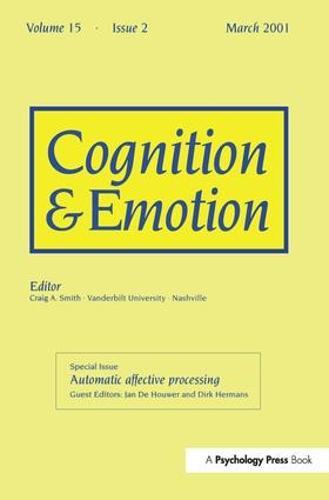Overview
The concepts ""affect"", ""valence"" and ""attitude"" are all fundamentally linked to the basic psychological dimension of good vs bad, positive vs negative, approach vs avoid. Affective processing refers to the act of determining the location of a stimulus on the affective dimension. Over the past few decades, scholars of emotion theory, social psychology, and learning psychology have put forward the hypothesis that affective processing does not depend on controlled cognitive processing. That is, they propose that organisms are able to determine whether a stimulus is good or bad without engaging in intentional, goal-directed, conscious, or capacity-demanding processing of the (evaluative attributes of the) stimulus. Rather, affective processing could occur automatically. Such automatic affective processing was believed to have an important impact on subsequent cognitive processing and behaviour. These proposals led to a multitude of research. New paradigms were developed that allow one to study the conditions under which stimulus valence can be processed and efforts were directed at understanding how such affective processing influences subsequent cognitive processing and behaviour. The aim of this special issue is to provide an overview of some of (a) the paradigms that are available to study automatic affective processing, (b) the knowledge about affective processing that has been gained over the last years, and (c) the issues and questions that are currently being addressed and that will most likely dominate the research in years to come.
Full Product Details
Author: Jan De Houwer , Dirk Hermans
Publisher: Taylor & Francis Ltd
Imprint: Psychology Press Ltd
Volume: 15
Dimensions:
Width: 15.60cm
, Height: 0.80cm
, Length: 23.40cm
Weight: 0.260kg
ISBN: 9780863776465
ISBN 10: 0863776469
Pages: 138
Publication Date: 08 February 2001
Audience:
College/higher education
,
Undergraduate
,
Postgraduate, Research & Scholarly
Format: Paperback
Publisher's Status: Active
Availability: In Print 
This item will be ordered in for you from one of our suppliers. Upon receipt, we will promptly dispatch it out to you. For in store availability, please contact us.
Table of Contents
J. De Houwer, D. Hermans, Editorial. R.H. Fazio, On the Automatic Activation of Associated Evaluations: An Overview. D. Hermans, J. De Houwer, P. Eelen, A Time Course Analysis of the Affective Priming Effect. J. Musch, K.C. Klauer, Locational Uncertainty Moderates Affective Congruency Effects in The Evaluative Decision Task. J. De Houwer, G. Crombez, F. Baeyens, D. Hermans, On the Generality of the Affective Simon Effect. J.E. Swanson, L. A. Rudman, A.G. Greenwald, Using the Implicit Association Test to Investigate Attitude-behavior Consistency for Stigmatized Behavior. K. Rothermund, D. Wentura, P.M. Bak, Automatic Attention to Stimuli Signalling Chances and Dangers: Moderating Effects to Positive and Negative Goal and Action Contexts. M.G. Calvo, M.W. Eysenck, Early Vigilance and Late Avoidance of Threat Processing: Repressive Coping vs. Low/High Anxiety.
Reviews
Author Information
Jan De Houwer, Dirk Hermans
Tab Content 6
Author Website:
Countries Available
All regions
|



